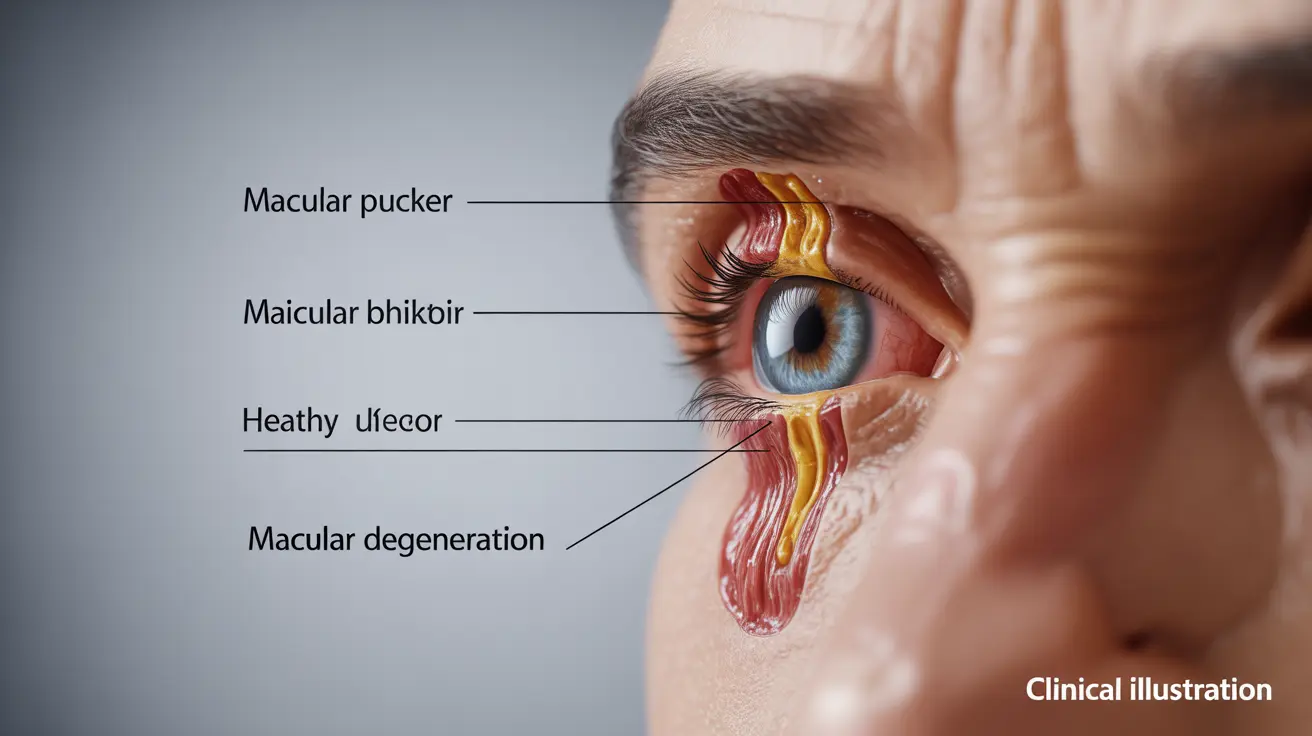When it comes to eye health conditions affecting the macula, understanding the distinctions between macular pucker and macular degeneration is crucial for proper diagnosis and treatment. While both conditions can impact central vision, they have different causes, progression patterns, and treatment approaches.
This comprehensive guide explores the key differences between these two eye conditions, helping you better understand their unique characteristics, symptoms, and available treatment options.
Understanding the Basic Differences
Macular pucker and macular degeneration are distinct conditions affecting the macula, the central part of the retina responsible for detailed vision. While they may share some similar symptoms, their underlying causes and mechanisms differ significantly.
What is Macular Pucker?
A macular pucker occurs when a thin layer of scar tissue forms on the macula's surface, causing it to wrinkle or pucker. This condition typically develops as part of the natural aging process or following certain eye conditions or surgeries.
What is Macular Degeneration?
Macular degeneration is a progressive condition where the macula deteriorates over time, leading to central vision loss. It primarily occurs in two forms: dry (atrophic) and wet (neovascular), with the dry form being more common.
Distinct Symptoms and Visual Changes
Each condition presents unique symptoms that can help distinguish between them:
Macular Pucker Symptoms
- Blurred central vision
- Straight lines appearing wavy
- Difficulty reading or seeing fine detail
- Usually affects one eye more than the other
- Vision changes tend to be mild and stable
Macular Degeneration Symptoms
- Gradual loss of central vision
- Dark or blurry spots in central vision
- Difficulty recognizing faces
- Color perception changes
- Progressive worsening over time
Diagnostic Approaches
Eye care professionals use different diagnostic tools and techniques to identify and differentiate between these conditions:
Macular Pucker Diagnosis
- Optical Coherence Tomography (OCT)
- Dilated eye examination
- Fluorescein angiography when needed
Macular Degeneration Diagnosis
- Comprehensive dilated eye exam
- OCT imaging
- Amsler grid testing
- Regular monitoring for progression
Treatment Options and Management
The treatment approaches for these conditions differ significantly, reflecting their distinct underlying causes:
Treating Macular Pucker
- Observation for mild cases
- Vitrectomy surgery for severe cases
- Regular monitoring of vision changes
Managing Macular Degeneration
- AREDS2 supplements for dry AMD
- Anti-VEGF injections for wet AMD
- Lifestyle modifications
- Regular monitoring and treatment adjustments
Risk Factors and Prevention
Understanding risk factors helps in prevention and early intervention:
Macular Pucker Risk Factors
- Advanced age
- Previous eye surgery or trauma
- Retinal conditions
- Diabetic retinopathy
Macular Degeneration Risk Factors
- Age over 50
- Family history
- Smoking
- High blood pressure
- Poor diet
- Obesity
Frequently Asked Questions
What are the main differences in symptoms between macular pucker and macular degeneration? The key difference lies in progression and severity. Macular pucker typically causes mild, stable vision distortion, while macular degeneration leads to progressive central vision loss and can be more severe.
How are macular pucker and macular degeneration diagnosed and distinguished by eye doctors? Eye doctors use various imaging techniques, primarily OCT scans, along with comprehensive dilated eye exams. The appearance and location of tissue changes help distinguish between the two conditions.
What treatment options are available for macular pucker compared to macular degeneration? Macular pucker may require surgery in severe cases, while macular degeneration treatment includes supplements for dry AMD and anti-VEGF injections for wet AMD. Treatment approaches differ due to their distinct underlying causes.
Can macular pucker turn into macular degeneration or cause permanent vision loss? No, macular pucker cannot turn into macular degeneration as they are separate conditions. While macular pucker rarely causes severe vision loss, macular degeneration can lead to permanent central vision loss if untreated.
What risk factors increase the chances of developing macular pucker versus macular degeneration? Macular pucker is mainly associated with aging, eye trauma, and previous eye conditions. Macular degeneration risk factors include age, genetics, smoking, and lifestyle factors like diet and exercise.




